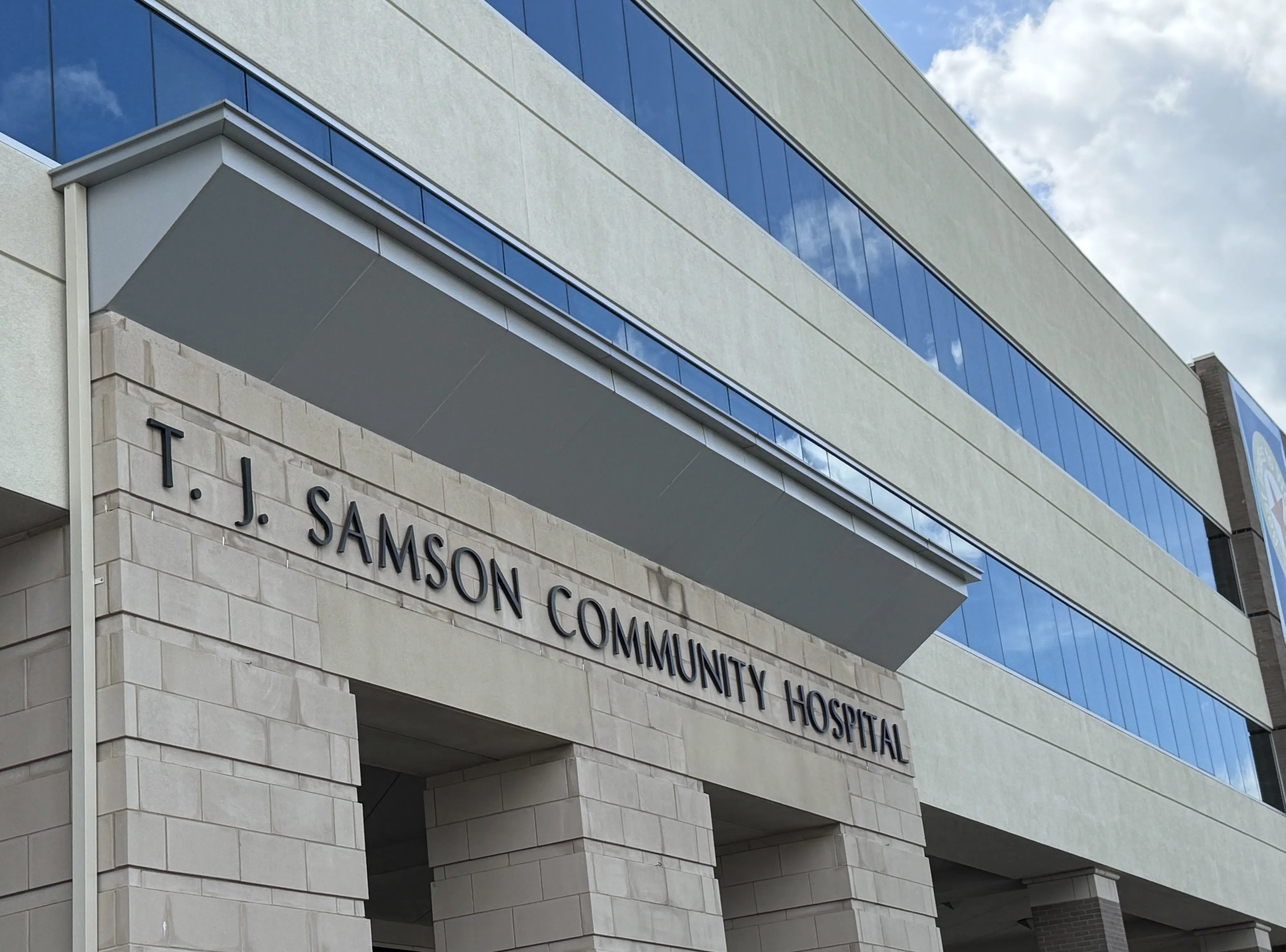
T.J. Samson Community Hospital is located at 1301 N. Race Street in Glasgow. Michael Crimmins/Glasgow News 1
By MICHAEL CRIMMINS
Glasgow News 1
T.J. Regional Health, and other rural hospitals, could see a decrease in funding if Republicans’ “One Big Beautiful Bill” becomes law.
On Tuesday, July 1, the United States Senate passed its version of the bill with Vice President JD Vance casting the tie-breaking yea vote, making it 51-50 margin with a few Republican no votes — including that of Kentucky Senator Rand Paul.
The Senate-approved bill now goes to the U.S. House of Representatives, which began deliberation on the bill Wednesday morning.
The bill slashes the Medicaid program for low-income people and some people with disabilities, according to the Kentucky Lantern.
T.J. Regional Health Chief Executive Officer Neil Thornbury said hospitals are “closely monitoring” the proposed Medicaid cuts, noting that “the real impact of these decisions will ultimately fall on patients.”
“These programs are the foundation of care for millions of Americans, and any significant reductions could jeopardize access to essential services, especially in rural communities, like ours,” Thornbury said in a written statement. “Rural hospitals do not just provide emergency care, they offer a lifeline for important services. For many patients, these facilities are the only nearby option for primary care, behavioral health, surgical procedures, maternity services, and more.”
“In the event of significant funding cuts, hospitals may be forced to reduce or eliminate services, meaning patients could be required to travel 60 to 90 miles or more for critical care,” his statement continued. “This focus on the financial health of hospitals is a small part of this conversation. The real emphasis and concern for our region and health system is about the dignity and well-being of patients who deserve timely, local, high-quality care, regardless of where they live.”
Thornbury stated that the healthcare industry is “advocating strongly for policies that prioritize access, equity, and sustainability. We remain committed to protecting the services our patients count on and ensuring that care remains close to home.”
Around one-third of Barren County’s population — 15,127 people — are on some type of Medicaid, according to the Kentucky Department for Medicaid Services, a department within the Cabinet for Health and Family Services.
The Kentucky Hospital Association sent a letter to the U.S. House highlighting the “unprecedented cuts to the Medicaid program” outlined in the Senate’s version of the bill.
Bart Logsdon with T.J. Regional Health and Jacob Hook with Med Center confirmed both hospitals endorsed the letter.
“One third of our citizens rely on the Medicaid program – it covers 50 [percent] of Kentucky’s children, as well as seniors and working families,” the letter states. “These cuts will remove billions of dollars in essential funding from our state and adversely affect our ability to provide care, train the next generation of caregivers, employ skilled workers and support local communities through the economic activity that results from our hospitals.”
Logsdon stated between 70 to 75 percent of T.J. Regional Health’s funding comes through Medicaid, and Hook said that number was 25 percent for Med Center Health.
“Our rural citizens are likely to experience the greatest reductions in services as rural providers already operate under difficult financial conditions,” the Kentucky Hospital Association stated. “All patients will suffer from these cuts because without the current state-directed payment program hospitals will be forced to close services used by all patients, not just those on Medicaid.”
An estimation from the Cecil G. Sheps Center for Health Services Research predicts that “35 hospitals are likely to close” if the Senate’s version of the bill becomes law.
“The human toll that these sweeping reductions will have on one of the poorest and most health-challenged states is unfathomable,” the letter stated.
In a press release following Tuesday’s Senate vote, the Kentucky Center for Economic Policy announced that tax cuts for the wealthy are the priority in this bill instead of funding these “vital programs.”
“The already-rich, whose incomes are soaring, should hardly be the priority at a time when many Kentuckians are struggling. These tax cuts for the wealthy are so large, that despite unprecedented cuts to popular programs, Congress would still increase the U.S. debt by $3.3 trillion over ten years,” Executive Director Jason Bailey said in the press release. “As Kentucky’s U.S. House delegation prepares to consider the Senate version of this bill. We urge the members to prioritize the vast majority of Kentuckians and oppose cuts to vital [programs].”
Kentucky Governor Andy Beshear called it the “big, ugly bill” after hearing of its passage in the senate Tuesday in a statement to the press.
“With the passage of the ‘big, ugly bill,’ the U.S. Senate said it was okay to fire 20,000 Kentucky health-care workers, close 35 rural hospitals in our state and throw over 200,000 of our people off insurance,” Beshear said. “This ain’t right, and we’re going to keep raising our voice and standing up for our Kentucky families, who deserve better.”
Comments